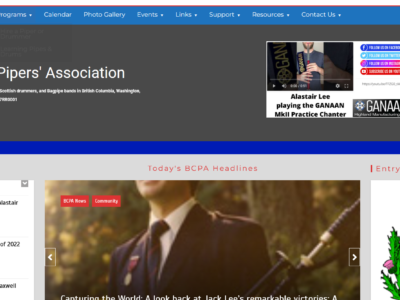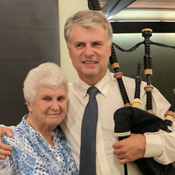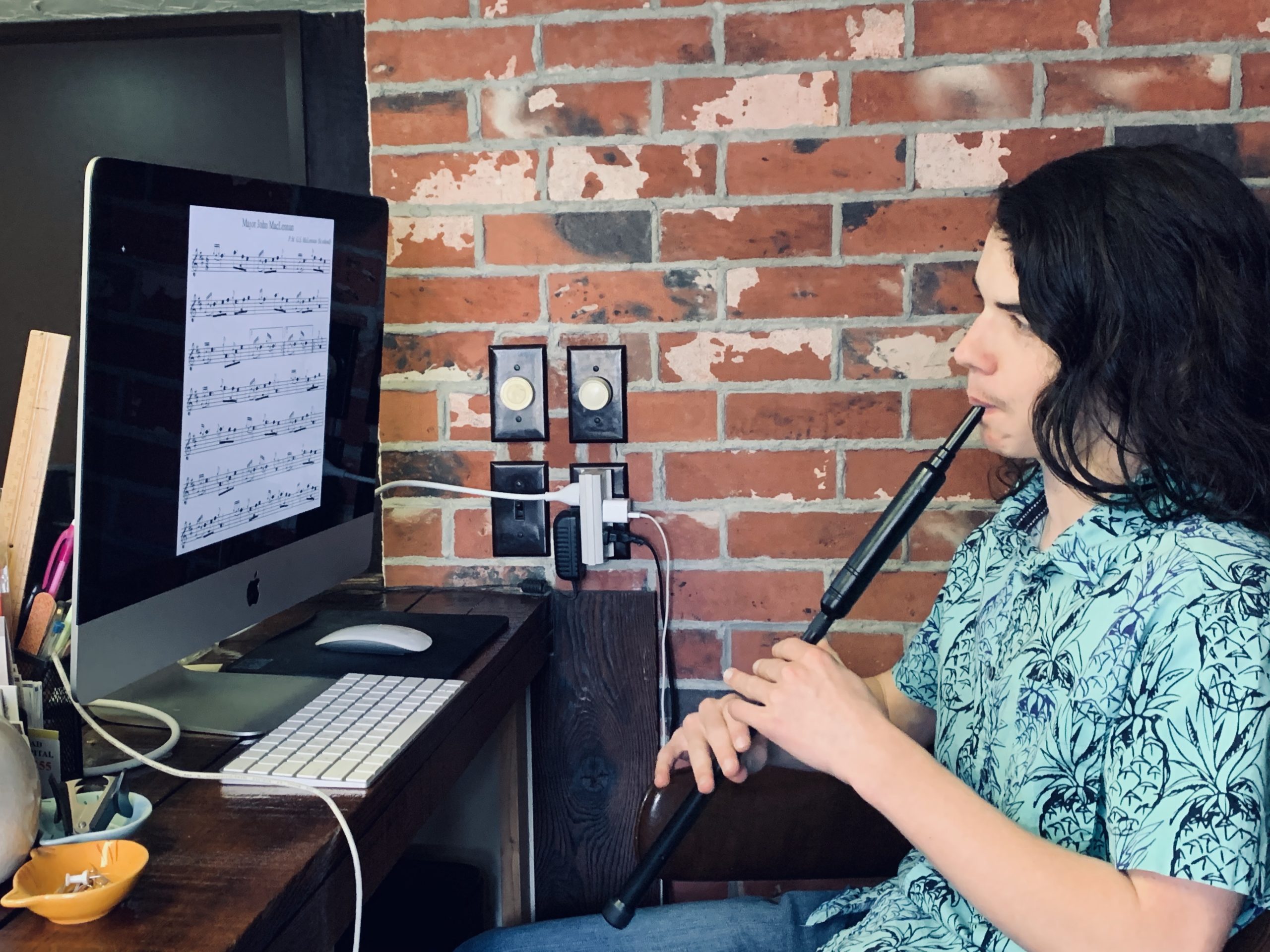
Colin Richdale of the White Spot Pipe Band practicing online.
In the bedrooms, living rooms and kitchens of the members of the Northwest Junior Pipe Band, the novel coronavirus COVID-19 may have shut down in-person practices in Washington State, but the band plays on. Around the Pacific Northwest, the novel coronavirus pandemic is reeking havoc among pipe bands preparing for the upcoming competition season, but in some places, kids continue to learn and practice ancient instruments, thanks to modern technology.
“We have had to come to terms with the fact that online group lessons are really not a good substitute for actual band rehearsal, but it fills a need for group interaction and serves as a weekly check-in with our players,” says piping instructor Kevin Auld of the Northwest Junior Pipe Band of Edmonds, WA.
Like other bands around the world, the Northwest Junior Pipe Band is trying to adapt to the current COVID-19 situation. The band continued regular rehearsals until the government ordered all group gatherings shut down in mid-March. Band instructors then began discussing possibly alternatives and within a short time came up with an online plan to keep kids engaged and learning despite the obstacles.
“We are moving our program online in different stages,” says Auld. “Currently our Grade 4 competition band is doing online group lessons each week. Next, we will be moving our parade band and then our pipe band school to the online learning program.”
With 10 different classes and 21 kids in various levels of learning, Auld admits it will be a challenge.
“We are making a big effort to keep band morale up and kids engaged by sending out lots of fun videos to watch, music to listen to and new tunes to learn. The parents are going to be instigating some other social events for kids like online games night,” says Auld.
In Surrey, BC, the White Spot Pipe Band is also planning online lessons to keep kids engaged and the learning process uninterrupted.
“We had a test meeting with out instructors via Google Hangouts and we found it somewhat difficult to manage. For this reason we are mostly deciding to have one-on-one online practice sessions with our members,” says Kyla MacNeil, band manager and an instructor with the White Spot Pipe Band organization.
“Starting March 30, some instructors will hold one-on-one sessions, especially for the beginner students. Some of us will have students submit recordings of themselves for individual comment and help, likely via Google Classroom,” says MacNeil.
“Having them submit recordings keeps them focused for the rest of the week and creates goal-oriented home practice,” says Kevin Auld. “In our current situation, with the entire pipe band season at risk, we feel it’s important to create short and long-term goals in order to keep the kids engaged and improving.”
It’s a sentiment echoed by the Robert Malcolm Memorial Pipe Bands (RMMPB), which has
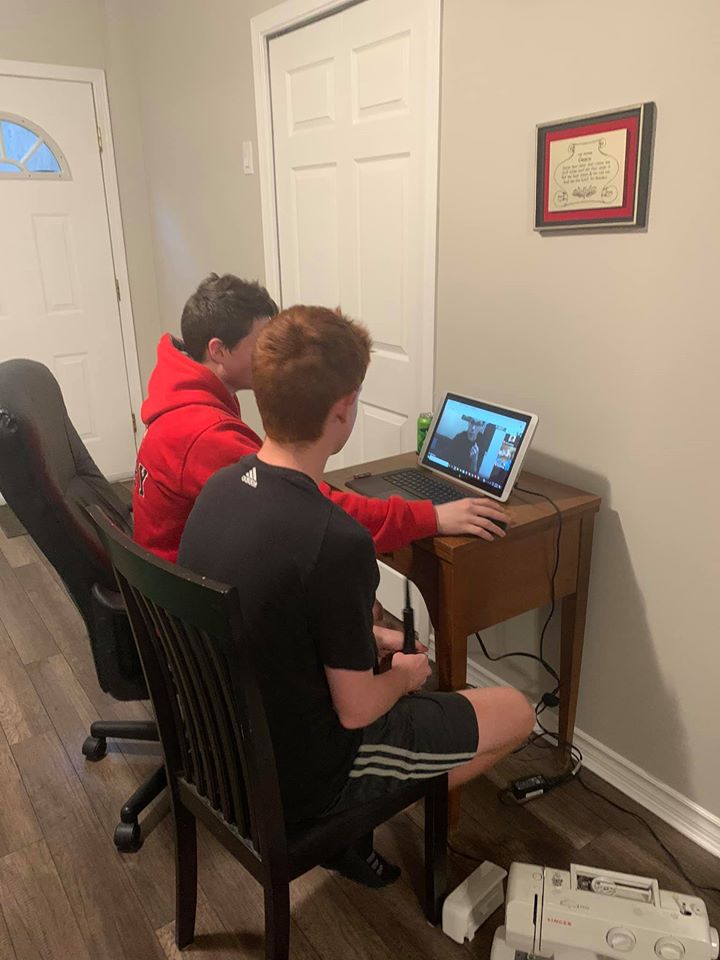
Fergus & Ronan Terry from RMM 3 PB online with instructor Zephan Knichel
already hosted one online practice for all 19 classes.
“We think it’s important to keep teaching and have kids keep learning,” says Andrew Lee, RMMPB Director of Piping. “Just because they are not competing doesn’t mean they can’t learn. Our main objective is to provide high-level music education and foster a love of the music. Competition is an important tool to achieve that, but it is not the end goal,” says Lee.
For technology, bands are turning to available online tools such as Google Hangouts or Google Meets. Others find that Zoom works best.
RMMPB is currently using Google Meet, which provides a large platform for the four RMM bands, each with three separate sections plus several levels of beginners.
“We may need a larger platform,” says Lee.
In Washington, the Northwest Junior Pipe Band is also experimenting with different technology.
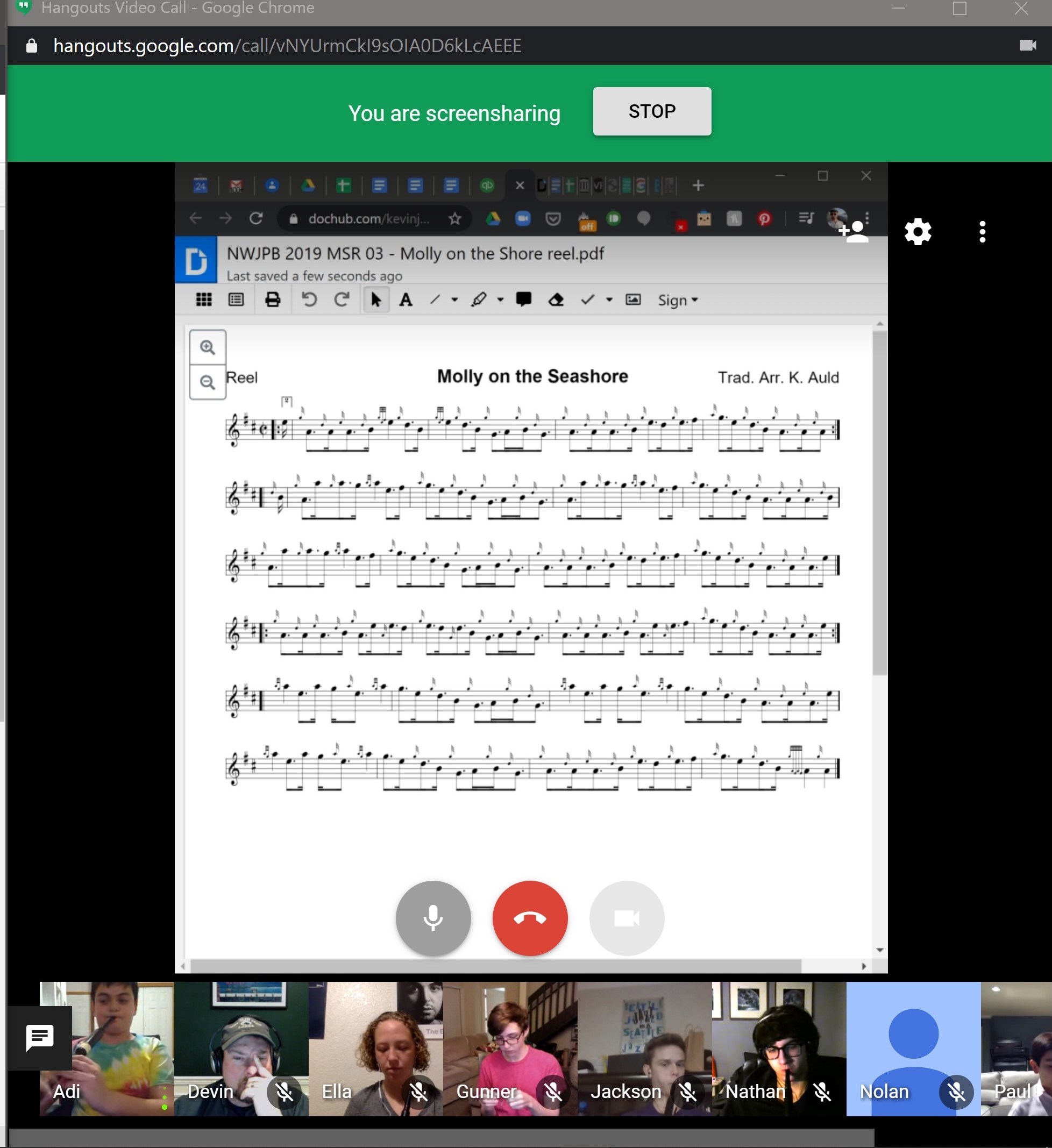
Northwest Junior PB online instruction
“Each (band) subsection meets separately, using whichever software works best for the instructor and students,” says Auld. “For instance, our pipers are using Google Hangouts and our tenor/bass corps is using Zoom. Hangouts works well for the pipers because the broadcast sound quality seems to be better for practice chanters than on Zoom. One drawback to using Hangouts is that it has a limit of 10 participants – so we may upgrade to Google Meet if we need to add more pipers to the lesson.”
Online technology is not limited to instruction only. The BC Pipers’ Association has been using online tools for many years to reach its members across a wide geographical area. The BCPA Annual Adjudicators Conference and all Board of Directors meetings are held online, and for many years the BCPA Annual Gathering Open solo competitions and all the band competitions have been livestreamed along with the Boney Music Memorial Invitational (and the BCPA Knockout Open Piping and Drumming competitions, which preceded them). Now, the BCPA is investigating a mechanism to allow for online adjudication.
“We are testing our technological tools for providing (virtual) performance assessments, similar to what players would receive from an adjudicator at a highland games, to support the players’ musical development that their instructors are valiantly carrying on with,” says Rob MacNeil, President of the BCPA. “In the current environment, the prime objective has to be providing periodic performance assessments, not prize lists.”
MacNeil says the organization is also considering opening up the BCPA online tool-kit to member bands of the organization which cannot establish adequate online tools themselves at this point (e.g. significantly limited numbers of participants on the free accounts from Zoom and Google, long setup times and significant IT expertise needed to create and implement a GSuite for Nonprofits account). The BCPA is willing to assist bands looking to move online with advice and assistance. (For assistance, contact BCPA Communications Chair Garth Newlands at communications@archive.bcpipers.org)
What all bands agree on is that online teaching is not a perfect solution. Online lessons and rehearsals are not ideal for all classes, especially advanced bands. In addition, an online platform that works for pipers doesn’t necessarily work for drummers.
“Online isn’t perfect,” says Lee, “but it’s better than nothing.” And, for those venturing into the online instruction world, Lee recommends the following: “Be patient. It’s a learning experience for everyone.”

